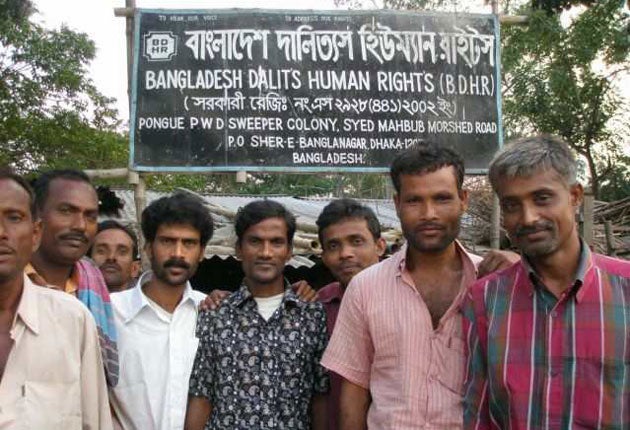Oppressed Dalits of Bangladesh fight for their future
The 'untouchables' are hoping to break centuries of discrimination with thehelp of the charity One World Action. Andrew Buncombe reports from Dhaka

Ramu Nandikolla's dream is quite simple. He hopes that unlike himself, unlike his father, unlike his grandfather and unlike every member of his family for centuries, his four-year-old daughter grows up to be something other than a sweeper.
"I have been educated to an advanced level by Bangladeshi standards and I have applied for government jobs but they tell me that I have to work as a sweeper," says the 29-year-old. "They say, 'Your father was a sweeper and you have to be a sweeper as well'. It makes me feel very bad. I wanted to train to be a nurse."
Ramu is a Dalit, a member of a so-called "untouchable" caste that sits at the very bottom of traditional Hindu society. Forced to live in separate communities, tradition has held that a higher-caste person touching a Dalit, or in some cases coming within the shadow of a Dalit, had to be ritually cleansed. In some communities Dalits were forced to ring a bell as they walked to warn of their presence.
There are 300 million Dalits in South Asia. They are expected to perform only society's most unpleasant tasks such as unclogging drains, removing corpses and cleaning toilets by hand. In India, Dalits have recently made considerable progress in terms of poverty reduction, access to jobs and winning power. Mayawati, the chief minister of India's largest and most politically important state, Uttar Pradesh, is a Dalit and there is even talk of her one day becoming prime minister.
But here in Bangladesh, where90 per cent of the population is Muslim and just 8 per cent Hindu, the Dalits have a much lower public profile and no political power. And for all the discrimination they face, Dalit groups say the Bangladeshi authorities do not officially recognise that Dalits even exist. "They say there is no such thing as a Dalit," says Ramu. "They say everybody is equal."
The Dalits of Dhaka say their ancestors were brought to what is now Bangladesh from Hyderabad in southern India by the British Empire to perform manual work. The community's first language remains not Bengali but Telugu, a southern Indian tongue and the name they sometimes use to describe themselves.
But after centuries of discrimination – of being refused access to jobs and education, of being forced to live in the most wretched neighbourhoods and of being told they cannot escape their fate – Bangladeshi's Dalits are slowing gaining hope. Organisations have been working at a grass-roots level to educate Dalits and make them aware of their potential influence if they can work together.
"Dalit rights is a new idea in Bangladesh [even though] there are probably five million in the country," says Zakir Hossain, who heads the Dhaka-based human rights group, Nagorik Uddyog. The group is funded by One World Action, one of the charities supported by The Independent's Christmas Appeal, and its objectives are three-fold. "We want to increase awareness, we want the government to introduce reservations for Dalits in jobs and at universities and we want a law that ends discrimination."
Ramu led The Independent on a tour of his Dalit neighbourhood. The PWD Sweeper Colony is next to a clinic which since the time of the British Empire has been called the Pongo hospital and there is not a lot of room. A maze of alleys divide the bamboo and metal-sheet homes. More than 400 people are squeezed here, extended families sharing a few rooms, six people crushed in a bed.
The homes are spotless and well-cared for, but the facilities are wretched. Running hose-pipes at the rear of the houses provide water that runs into a stinking, stagnant ditch. This is also the only toilet facility. There is no school, no clinic. "The main problem here is that there are insufficient houses," says Aparo Pulatti, a community leader. "The big problem is that we are landless."
Two years ago, without notice, the authorities evicted 20 Dalit families from a patch of land they had occupied for more than 60 years. They were told the government wanted it for development. The families were moved to the very northern edge of the city, next to an estuary.
The people have been literally marginalised, miles from their jobs. They live now in a few narrow streets of concrete homes provided by the government. The land adjoining their community is a makeshift brick factory, where women mix sand and burnt straw to fashion bricks that are "cooked" by stinking and choking fires. "We are in a very bad position here," says Mehalaxmi Rissi, another community leader. "The conditions are not good. There is no fresh water. There is no security."
Ramu works as a cleaner at the Pongo hospital. Such was the determination of his father that his son should be educated, that he sent him to a relative outside Dhaka, gave him a different family name and told him not to disclose his background. Even that was not enough for this smart young man to break through the spirit-crushing discrimination.
He is determined his child will not suffer a similar fate. Ramu's daughter is aged four and her name is Harivend. I asked Ramu what he would like his daughter to become. As he smiles at his little girl, he answers without hesitation: "I want her to be a doctor."
Join our commenting forum
Join thought-provoking conversations, follow other Independent readers and see their replies
Comments